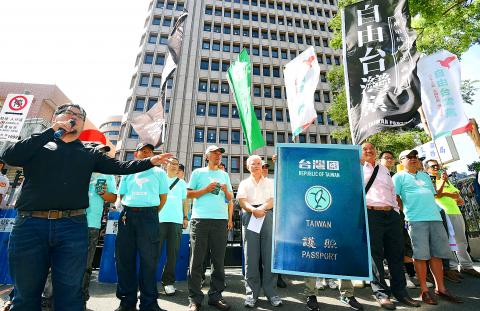Taiwanese should be allowed to put “Republic of Taiwan” stickers on their passports, pro-independence activists said yesterday at a protest outside the Bureau of Consular Affairs building.
“People are able to smoothly go through [passport control using passports with stickers] on all major continents – the only officials who make things difficult are the border officials of the Republic of China,” said Chou Wei-li (周維理), the convener of the Restoration of Taiwan Social Justice student group.
Republic of China is Taiwan’s official name and is engraved on the cover of all Taiwanese passports above the national emblem, which is derived from the emblem of the Chinese Nationalist Party (KMT).

Photo: Liu Hsin-de, Taipei Times
Stickers promoted by the activists cover the “Republic of China” with the “Republic of Taiwan” as separate stickers are used to cover up the national emblem with images of national wildlife.
“The Republic of China passport causes Taiwanese to experience humiliation internationally,” said Free Taiwan Party Chairperson Tsay Ting-kuei (蔡丁貴), stating that the passport often led bearers to be confused with citizens of the People’s Republic of China, causing customs delays in countries which allow visa-free entry Taiwanese citizens.
Party spokesperson Lin Yu-lun (林于倫) said they were rallying to protest the comments made by Minister of Foreign Affairs David Lin (林永樂) at the Legislative Yuan earlier this week, that using stickers to cover the “Republic of China” on passports would be illegal.
“If all you are doing is putting the demands you wish to express on the passport, that is not illegal in and of itself,” Lin said, stating that rules only forbid altering the content of the passports, such as manipulating the content of the smart chips or altering passport numbers.
The minister had stated three years ago that putting stickers that read “Taiwan is my country” on passports was legal in response to a movement at the time, Lin said.
After shouting slogans opposing the minster’s statements at the Legislative Yuan, Tsay attempted to climb into the consular affairs complex, but was stopped by police.
Kung Chung-chen (龔中誠) the Director-General of the Ministry of Foreign Affairs Bureau of Consular Affairs stated that the stickers would be illegal under amendments to the Passport Statute (護照條例) passed by the Legislative Yuan in May which are to go into effect in January.
He said that according to the regulations the ministry would have the authority to cancel any passport that bears the stickers, as well as extending the review process for passport renewal for people carrying passports with the stickers.
He added that people who put stickers on their passports risked customs problems, displaying an e-mail from the American Institute in Taiwan’s (AIT) director of consular affairs, which stated that if stickers were placed over the name “Republic of China,” US border officials would “reserve the right to seize the altered document and refuse the traveler’s entry.”

A preclearance service to facilitate entry for people traveling to select airports in Japan would be available from Thursday next week to Feb. 25 at Taiwan Taoyuan International Airport, Taoyuan International Airport Corp (TIAC) said on Tuesday. The service was first made available to Taiwanese travelers throughout the winter vacation of 2024 and during the Lunar New Year holiday. In addition to flights to the Japanese cities of Hakodate, Asahikawa, Akita, Sendai, Niigata, Okayama, Takamatsu, Kumamoto and Kagoshima, the service would be available to travelers to Kobe and Oita. The service can be accessed by passengers of 15 flight routes operated by

Chinese spouse and influencer Guan Guan’s (關關) residency permit has been revoked for repeatedly posting pro-China videos that threaten national security, the National Immigration Agency confirmed today. Guan Guan has said many controversial statements in her videos posted to Douyin (抖音), including “the red flag will soon be painted all over Taiwan” and “Taiwan is an inseparable part of China,” and expressing hope for expedited reunification. The agency last year received multiple reports alleging that Guan Guan had advocated for armed reunification. After verifying the reports, the agency last month issued a notice requiring her to appear and explain her actions. Guan

GIVE AND TAKE: Blood demand continues to rise each year, while fewer young donors are available due to the nation’s falling birthrate, a doctor said Blood donors can redeem points earned from donations to obtain limited edition Formosan black bear travel mugs, the Kaohsiung Blood Center said yesterday, as it announced a goal of stocking 20,000 units of blood prior to the Lunar New Year. The last month of the lunar year is National Blood Donation Month, when local centers seek to stockpile blood for use during the Lunar New Year holiday. The blood demand in southern Taiwan — including Tainan and Kaohsiung, as well as Chiayi, Pingtung, Penghu and Taitung counties — is about 2,000 units per day, the center said. The donation campaign aims to boost

The Central Weather Administration (CWA) said a magnitude 4.9 earthquake that struck off the coast of eastern Taiwan yesterday was an independent event and part of a stress-adjustment process. The earthquake occurred at 4:47pm, with its epicenter at sea about 45.4km south of Yilan County Hall at a depth of 5.9km, the CWA said. The quake's intensity, which gauges the actual effects of a temblor, was highest in several townships in Yilan and neighboring Hualien County, where it measured 4 on Taiwan's seven-tier intensity scale, the CWA said. Lin Po-yu (林柏佑), a division chief at the CWA's Seismological Center, told a news conference